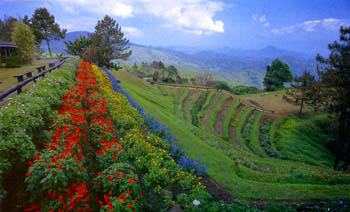The Land And Its People
 Thailand display
considerable geographical and climatic variety in its four major regions. The
far north, where the nationís borders meet those of Burma and Laos, is
mountainous with valleys watered by a number of rivers and streams; during the
winter months temperatures are cool enough to permit the cultivation of such
temperate Ė zone crops as coffee, lychees, and strawberries, suffers from
frequent droughts, although thise are being allevialed by an increasing number
of reservoirs and other man Ė made water facilities. The central plains region,
through which flows the Chao Phraya River, is one of the most fertile rice-growing
areas in the world and has been the scene of Thailandís greatest historical
development. The narrow southern peninsula, stretching to Malaysia, has
coastlines with spectacular beaches along both the Gulf of Thailand and the
Indian Ocean and lofty jungled mountains in many areas,
Thailand display
considerable geographical and climatic variety in its four major regions. The
far north, where the nationís borders meet those of Burma and Laos, is
mountainous with valleys watered by a number of rivers and streams; during the
winter months temperatures are cool enough to permit the cultivation of such
temperate Ė zone crops as coffee, lychees, and strawberries, suffers from
frequent droughts, although thise are being allevialed by an increasing number
of reservoirs and other man Ė made water facilities. The central plains region,
through which flows the Chao Phraya River, is one of the most fertile rice-growing
areas in the world and has been the scene of Thailandís greatest historical
development. The narrow southern peninsula, stretching to Malaysia, has
coastlines with spectacular beaches along both the Gulf of Thailand and the
Indian Ocean and lofty jungled mountains in many areas,
The country is blessed with an
equal variety of natural resources. Though logging is now restricted in the leak
forests of the north, the region contains rich deposits of flourite, wolfram and
tungsten and its riverine valleys support a large number of orchards and farms.
Potash is plentiful in the northeast, and mulberry plantations have
traditionally sustained the cultivation of silkworms. Both flourite and gems are
mined in the west, while some of the finest sapphires in the world come from the
mountains of the southeast. The Chao Phraya valley is a vast network of
irrigation canals which supply water not only to countless rice fields but also
to vegetable farms and fruit orchards. Natural gas deposits in the Gulf of
Thailand are supplying energy for many development projects, particularly along
the Eastern Seaboard. In addition to a plentiful supply of seafood, the south
has extensive deposits of tin and huge plantations of coconuts, cashews, and
other fruits,
 Though the great majority of
Thailandís 50 million people are ethnically Thai and Buddhist, the country has a
substantial number of minority groups who have historically lived together in
harmony. Of these the Chinese are perhaps the most numerous, particularly in
urban areas, though they have become so thoroughly assimilated it would be
difficult to isolate them as a distinct group. Similarly, while there are Laos
and Khmer groups in the northeast and west, nearly all regard themselves as Thai,
culturally as well as by nationality. More clearly defined are the Muslims, who
are mainly concentrated in the southern provinces, and assorted hill tribes who
live in the far north; there are also sizeable communities of Hindus and Sikhs
in large cities like Bangkok.
Though the great majority of
Thailandís 50 million people are ethnically Thai and Buddhist, the country has a
substantial number of minority groups who have historically lived together in
harmony. Of these the Chinese are perhaps the most numerous, particularly in
urban areas, though they have become so thoroughly assimilated it would be
difficult to isolate them as a distinct group. Similarly, while there are Laos
and Khmer groups in the northeast and west, nearly all regard themselves as Thai,
culturally as well as by nationality. More clearly defined are the Muslims, who
are mainly concentrated in the southern provinces, and assorted hill tribes who
live in the far north; there are also sizeable communities of Hindus and Sikhs
in large cities like Bangkok.